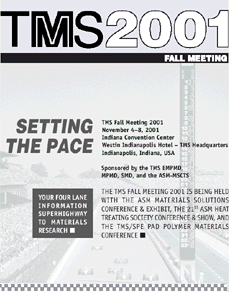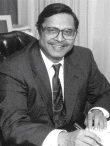
2001 TMS Fall Meeting: Special Events
November 4–8, 2001 · TMS FALL
MEETING 2001 · Indianapolis, Indiana
 The
TMS Fall Meeting
2001 will be headquartered at the Westin
Indianapolis Hotel, Indianapolis, Indiana, November 4–8, 2001. All TMS technical
sessions and events will take place in the Indiana
Convention Center. TMS Committee Meetings will take place at the Westin
Indianapolis Hotel. ASM events will take place at the Indianapolis Marriott
Downtown.
The
TMS Fall Meeting
2001 will be headquartered at the Westin
Indianapolis Hotel, Indianapolis, Indiana, November 4–8, 2001. All TMS technical
sessions and events will take place in the Indiana
Convention Center. TMS Committee Meetings will take place at the Westin
Indianapolis Hotel. ASM events will take place at the Indianapolis Marriott
Downtown.
Focusing on physical metallurgy and materials, the TMS
Fall Meeting 2001 will feature a wide array of technical symposia sponsored
by The Minerals, Metals & Materials Society
(TMS). The TMS
2001 Fall Meeting is being held with the ASM
Materials Solutions Conference & Exhibit, the 21st
ASM Heat Treating Society Conference & Show, and the TMS/SPE
PAD Polymer Materials Conference.The TMS Fall Meeting draws visitors from
around the world and is a must for anyone interested in the latest research
and development in physical metallurgy and materials. The meeting features numerous
technical symposia covering everything from metal-matrix composites, polymers,
and computational thermodynamics, friction stir welding, solidifications, materials
design, to alloy phases--just to name a few of the many topics discussed.
2001 JOINT CONFERENCE KEYNOTE SESSION
Date: November 5, 2001
Location: Indiana Convention Center
Kicking off the week is an All-Conference Joint Keynote Session, including a
presentation by Professor Jan-Anders E. Manson, of the Laboratory of Composite
Technology, Ecole Polytechnique Federale de Lausanne, Lausanne, Switzerland,
as part of the TMS/SPE PAD Polymer Materials Conference.
Monday morning, Professor Manson is speaking on polymer composite technology.
YOUNG LEADERS TUTORIAL LUNCHEON
LECTURE
Topic: Soldering Technology in Electronic Package and Assembly
Speaker: Dr. Fay Hua, Intel Corporation
Sponsored by: TMS Young Leaders Committee
Date & Time: November 5, 2001, 12:00 noon-1:30PM
Location: Westin Indianapolis Hotel
Solder alloys have been used extensively in electronic packaging. Unfortunately,
most of these alloys contain Pb and are, thus, not environmentally benign. A
large-scale effort is underway to replace existing Pb-Sn alloys with Pb-free
alloys of similar properties. This talk will focus on new developments and properties
of new Pb-free solder alloys.
Dr. Fay Hua received her Ph.D. from Vanderbilt University in Materials Science
and Engineering in 1995, and quickly joined the Hewlett Packard Company. She
led the Hewlett-Packard company Pb-free conversion effort and was recognized
as technical leader in the area. Recently, she joined Intel Corporation as materials
technologist, where she is leading and working on all package aspects of soldering
technologies. She has authored and co-authored over 40 papers in Pb-free soldering
technology in electronic package and assembly.
The Young Leaders Tutorial Lecture includes an optional “brown bag” lunch for
$25, which should be purchased in advance at the On-Site Registration Desk.
There will be no charge for those attending the lecture who do not wish to purchase
the lunch.
ASM/TMS DISTINGUISHED LECTURESHIP
IN MATERIALS AND SOCIETY
Date & Time: November 7, 2001, 12:45PM-1:45PM
Location: Indiana Convention Center
Lecturer: Dr. Bhakta B. Rath, Associate Directory, Materials Science
and Component Technology Directorate, Naval Research Laboratory
Topic: Abundance of Frozen Clean Energy from the Sea
Abstract:
Methane hydrates occur naturally in ocean sediments as a crystalline solid under
proper conditions of temperature and pressure in a water environment. The crystalline
frame-work of water molecules captures the methane during crystallization and
forms icy solids known as clathrates. Abundant methane hydrate deposits are
found along all continental shelves of the world either on the surfaces of sea-beds
or shallow depths in the sediment. The total amount of concentrated methane
deposits is estimated to be over twice the known amount of carbon in earth’s
fossil-fuel reserves. With a rapid depletion of oil reserves, the vast hydrate
deposits have the potential of becoming the major energy resource for the 21st
century. Nearly pure methane, with highest energy density and cleanest combustion
of all hydrocarbons, can be easily and economically separated from the hydrate
deposits, by simply altering tem-perature, pressure or composition. A number
of research and development issues such as: structure, chemistry, thermodynamic
and kinetic factors on formation and phase stabilities of hydrates, locations
and quantification of hydrate deposits and stability zones, seafloor geophysical
proper-ties, nature of methane transport through sediments and environmental
impacts need to be well understood before economic exploitation of this vital
resource can be real-ized. Current efforts and future plans of a number of na-tions
will be discussed.
Biography:
Dr. Rath’s academic career includes a Ph.D. from Illinois Institute of Technology.
From 1961 to 1965, he held a tenured position at Washington State University.
In 1965 he joined the staff of the Edgar C. Bain Laboratory for Fundamental
Research of the US Steel Corporation, and in 1972 continued on to head the Metal
Physics Research Section of the McDonnell Douglas Research Laborato-ries. He
joined the Naval Research Laboratory in 1976 as Head of the Physical Metallurgy
Branch, and in 1982 served as Superintendent of the Materials Science and Technology
Division while serving as Adjunct Professor at various universities.
He serves as a member of several steering, planning, review, and advisory boards
and has received numerous awards and honors, including the 1999 “Presidential
Rank Award,” presented by The President of the United States for sustained outstanding
achievements of a senior executive. Dr. Rath has been one of the primary forces
in enhancing research collaborations between India and the United States in
the broad field of Physical and Materials Sciences.
Dr. Rath represents the US Navy and the Department of Defense, and serves as
the Executive Chairman on “Materials and Processing Technology Group” for the
TTCP countries (USA, UK, Australia, Canada, and New Zealand). He has been appointed
by the US Secretary of Defense and the Secretary of US Navy to serve as a member
of the board to develop strategy and collaborative research on Methane Hydrates
with the Department of Interior, Department of Energy, NOAA and NSF.
ADVOCACY FOR MATERIALS SCIENCE AND ENGINEERING—THE
WASHINGTON “SCENE”
Date & Time: November 7, 2001, 2:00PM-5:00PM
Location: Indiana Convention Center
A Special session sponsored by the Public and Government Affairs Committee
of TMS and the Federal Affairs Committee of ASM International
Co-Chairs: Prof. Diran Apelian, Metal Processing Institute, WPI. Worcester,
MA; Mr. Bruce Boardman, Deere and Company, Moline, IL
Federal spending as a percentage of GDP from 1985-1999 has dropped 21% in
Engineering and 29% in the Physical Sciences. Since 1986, the number of bachelor’s
degrees awarded in engineering is down 21.1%. These are dangerous trends. If
these trends continue, and if federal research budget does not keep up with
the rise of our GNP, there is concern that the United States will not be able
to compete in the global marketplace. In contrast, funding for health related
initiatives has dramatically increased over the same period, particularly, the
NIH budget. We, as a community of materials scientists, engineers, practitioners
and industrialists, need to reverse the trend. What are desperately needed are
a unified voice, a genuine advocacy for materials science and engineering, and
an advocacy to bolster the investments in mathematics, engineering, and the
physical sciences. This special session has been organized jointly by the Public
and Government Affairs Committee of TMS, and the Federal Affairs Committee of
ASM to kick off a proactive initiative for an advocacy voice in Washington.
THREE KEYNOTE SPEAKERS WILL ADDRESS THESE ISSUES IN THIS SPECIAL FORUM.
- Prof. Merrilea Mayo: Penn State University, and ASTRA (Alliance for
Science and Technology Research in America) Board member. Dr Mayo will address
and review trends in the last decade, and will outline ASTRA’s agenda. She
will also frame the role and responsibilities of materials scientists and
engineers, as well as the role of the Professional Societies.
- Mr. Curt Supplee: Director of Legislative and Public Affairs, The
National Science Foundation (former sci-ence writer for the Washington Post).
Mr. Suplee will discuss the public’s perception of engineers and scientists,
and will provide a glimpse of “ourselves” in the societal mirror … the question
being: “do we like what we see? … and if not what do we need to do?”
- Ms. Robin Gibbin: National Academy of Engineering. Ms. Gibbin will
review and discuss NAE’s twenty greatest achievements of the 20th century.
She will provide a historical context of the role of Engineering and Society.
The information on this page is maintained by the TMS Meeting
Department (mtgserv@tms.org)
 The
TMS Fall Meeting
2001 will be headquartered at the Westin
Indianapolis Hotel, Indianapolis, Indiana, November 4–8, 2001. All TMS technical
sessions and events will take place in the Indiana
Convention Center. TMS Committee Meetings will take place at the Westin
Indianapolis Hotel. ASM events will take place at the Indianapolis Marriott
Downtown.
The
TMS Fall Meeting
2001 will be headquartered at the Westin
Indianapolis Hotel, Indianapolis, Indiana, November 4–8, 2001. All TMS technical
sessions and events will take place in the Indiana
Convention Center. TMS Committee Meetings will take place at the Westin
Indianapolis Hotel. ASM events will take place at the Indianapolis Marriott
Downtown.
